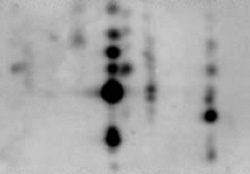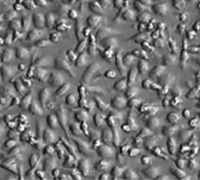Projects
Laboratory für clinical neuro chemistry and molecular diagnostics of neurodegenerative diseases

Our scientific focus is on the identification and validation of molecular biomarkers for the improved early and differential diagnostics of neurodegenerative diseases. In the process, predictive diagnostics of menacing neurodegenerative dementia, (e.g. preclinical Alzheimer’s dementia), is our main focus. Molecular biomarkers are identified in brain tissue, but most of all in body fluids such as blood or liquor samples. This is complemented by tests of different types of human cell populations (e.g. monocytes) and exosomes (blood and liquor). At the same time we perform more basics-oriented examinations of cell culture systems and in transgenic animal models, in order to identify new biomarker candidates on the one hand, but also, and primarily in order to functionally validate prior identified biomarker candidates in body fluids in these experimental models. We use the entire range of “neuromical” technologies for the identification and validation of biomarkers, e.g. gel- and or mass spectrometry-based neuroproteomic techniques, neurometabolomics, miRNA profiling and the measurement of epigenetic signatures. Next to hypothesis-free strategies, one focus is set on the hypothesis-guided biomarker identification. Promising biomarker signatures can be integrated into a high-throughput-capable multiplexdiagnostics.

The comparative analysis of these different platform technologies demands for a sophisticated bioinformatics and systemic neurobiology, which has been established at a high level within PURE as well as in long-term cooperating partners (MicroDiscovery GmbH, Berlin). Besides their use for diagnostic applications, molecular biomarkers will be utilized in order to monitor innovative therapeutic applications and to predict the response to therapy. In addition, the early detection of side effects will be examined. One can expect only very low concentrations (attomolar to sub-attomolar) of biomarkers for neurodegenerative diseases in blood. This is the reason for implementing more than one strategy. Brain specific biomarker candidates generally show significantly higher levels of concentration in cerebrospinal fluids (CSF/ liquor fluid) than in the blood compartment. Aided by the use of “CSF-guided biomarker discovery” we proceed as follows: After the identification of innovative biomarker candidates in the CSF, we selectively look for dementia-specific differences in the blood compartment using sensitive immunoassays or immune-PCR-methods.

In the field of hypothesis-guided approaches two molecular pathomechanisms are especially relevant for Alzheimer’s dimentia: (1) Hyperphosphorylation of proteins and (2) Protease-resistant protein aggregates in the form of soluble protein clumps (oligomers). For this purpose specific enrichment protocols for liquor- and blood samples will be applied, which take these molecular mechanisms into account.
Inside of the scientific Study Center for neurodegenerative diseases, we are establishing a high-quality prospective biomaterial bank as a decisive prerequisite for successful molecular biomarker research. In this context, a well monitored sample handling (pre-analytics) as well as a detailed clinical characterization (phenotyping) using imaging methods (MRI/PET) and neuropsychology is of special importance.
-
Klinik für Psychiatrie und Psychotherapie
Kliniken / Institut der Universität Duisburg-Essen
Prof. Dr. Jens Wiltfang
Tel. +49 (0) 201 7227-201
Fax +49 (0) 201 7227-303
jens.wiltfang@uni-due.de
Homepage

